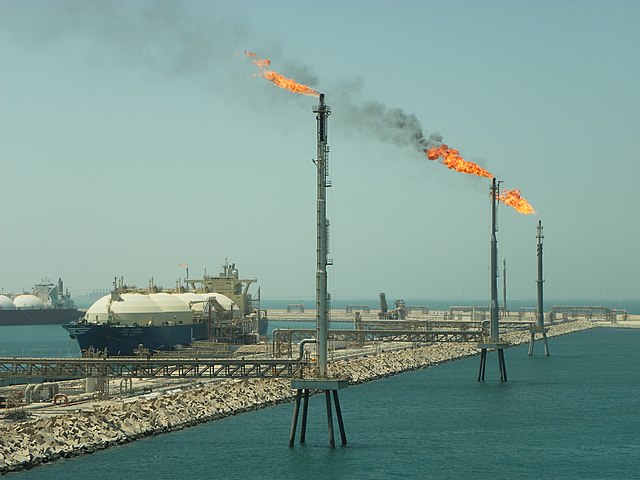 Ras Laffan LNG Terminal, Ras Laffan, Qatar by Matthew Smith
Ras Laffan LNG Terminal, Ras Laffan, Qatar by Matthew Smith
Europe, The United States, and Qatar: a Trilateral Relationship Boosting Energy Security
As winter approaches, Europe is still trying to find a reliable way to warm its citizens through the winter months. Even though the European natural gas reserves are up to 90 percent, that still will not be enough to keep the continent warm throughout the winter, especially if it is a very cold winter. The invasion of Ukraine by Russia caused the price of natural gas in Europe to skyrocket, and the subsequent sanctions enacted against Russia by Europe have left Europe without its largest natural gas supplier. Almost two years later, Europe has metaphorically bandaged, but not fully healed, the wound left by Russia. Europe has remedied its natural gas shortage by importing natural gas from the United States and Qatar, with both emerging as key natural gas suppliers. Through this developed energy security relationship, Qatar, the United States, and Europe have become more linked than ever before.
During the first half of 2022, total U.S. liquified natural gas (LNG) exports averaged 11.1 billion cubic feet per day (Bcf/d). In 2022, Europe imported, on average, 14.9 Bcf/d of natural gas. The U.S. exported 74 percent of all its LNG to Europe in the first half of 2022, but even if the U.S. exported 100 percent of its daily output of LNG, it still would not be able to supply Europe with all of its natural gas needs. The North Dome gas field, which resides in Qatari national waters, is the biggest in the world at 23,000 square miles, with 11 percent of the world’s and almost 30 percent of the Middle East’s reserves. In 2022, Qatar exported 10.4 Bcf/d. Qatar also plans to increase its natural gas infrastructure by 63 percent by 2027 and is looking for buyers for this increased capacity.
The growing relationship between Qatar, the US, and Europe benefits from shared geopolitical and security interests like the energy market. Qatar is only the third Gulf country to be designated as a major non-NATO ally. It has become a geopolitical broker between NATO and other countries in the Middle East. In 2020, Qatar facilitated a discussion between the U.S. and the Taliban, which ended 20 years of war in Afghanistan. The recent cooperation between Qatar and the United States over freezing $6 Billion of Iran’s money illustrates the growing trust and cooperation between the two countries. The more the relationships between these three parties grow, the more likely they are to rely on each other for energy needs, further deepening the relationship between America, Europe, and Qatar.
There has also been a significant increase in the economic relationships between European and American energy firms and Qatar. These firms are investing in infrastructure in Qatar to export more LNG. For example, French company Total, and Italian company Eni signed a deal to expand Qatari natural gas infrastructure. Furthermore, U.S. companies ExxonMobil and ConocoPhillips, UK’s Shell, Total, and Eni all received a percentage of the expansion of the Qatari North Field East Expansion project. At the same time, the Qatari government is investing in U.S. energy infrastructure.
A key aspect of energy security is diversifying where you receive energy from. Europe has already been caught once in this trap by relying heavily on Russian natural gas and needing a backup plan in case something was to happen. Then, when Russia invaded Ukraine, Europe felt the consequences of not diversifying its energy imports. The U.S. and Qatar offer a unique opportunity to Europe by allowing Europe to import natural gas from the world’s top two producers and exporters of LNG. Currently, the U.S. has seven LNG processing facilities that can super cool natural gas and put it on ships to export to Europe, with three new terminals under construction. Qatar has seven functional terminals with two expansions under construction. Thus, the U.S. and Qatar would be able to supply enough LNG to Europe while accounting for potential geopolitical risks.
Although relatively new, the trilateral relationship outlined above has become a staple in maintaining stability. Qatar and the United States have provided Europe with an answer to the catastrophic loss of Russian natural gas. Qatar serves Europe and the U.S. as an intermediary with pariah groups and states in the Middle East, allowing the U.S. and Europe to help further their national interests. The intertwining of natural gas infrastructure ensures that this trilateral relationship will last for the foreseeable future. Qatar has helped to solve many of the issues facing Europe and the United States and will only continue to establish itself as a critical partner for Western democracies in the Middle East.






